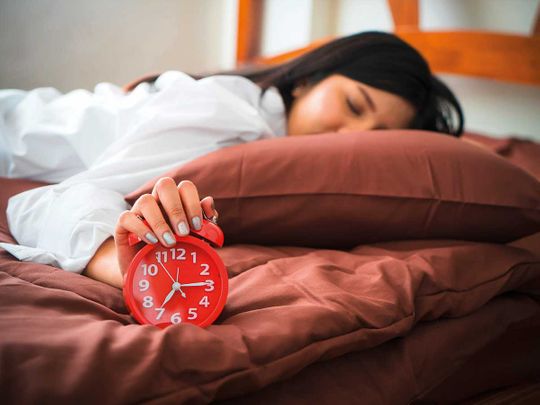
Dubai: Aside from setting seven alarms every morning — 5.30am, 5.34am, 6am, 6.30am, 7am, 7.30am, 8am — Angela also snoozes each of them as they ring every day of the workweek.
The result? She wakes up groggy, confused and disoriented every day of the week she toys with her alarm clock’s wake-up calls.
If you’re like her, read on as this bad habit, which we will call chronic snoozing, or the habit of always hitting the snooze button just to get a few more minutes of sleep, is not doing you any good.
Bina Mathews, speaker, success strategy and executive master NLP coach, says that how you feel when waking up greatly impacts how you begin your day and often even hours after that.
“The mood you begin the day with has a knock-on effect on all your decisions and actions for some time after that. The feeling that you are not in control of your routine isn’t the best one to begin the day with. Practically, getting up late means everything else gets delayed,” Mathews told Gulf News.
Apart from a ‘mood’ we arebattling with, research says that that seemingly intoxicated feeling we experience after waking up from interrupted deep sleep is actually called sleep inertia.
This typically affects us for 15 to 30 minutes, but can also last for up to four hours impacting our focus, productivity and makes it challenging for us to do even the simplest of everyday tasks.
How can one have sleep inertia?
A sleep cycle normally runs for about 90 minutes to two hours and one may have between four to six cycles per night.
Each sleep cycle has five stages of sleep, the first and second are when the body gets ready to dive into deep sleep in stages three and four, charaterised by slow-wave sleep that is the deepest form of non-REM (Rapid Eye Movement) sleep. The fifth stage is the REM sleep when we dream. Waking up is difficult during the deep sleep stage hence when one is woken up, sleep inertia takes place, according to the American Sleep Association.
90 minutes
normal duration of a sleep cycle. It can go up to two hours and one may have between four to six cycles per night“Additionally, your hormone levels get confused, resulting in you feeling tired and hungry at odd times and your colon gets confused resulting in irregular bowel movements. All of which lead to other complications like insomnia, obesity, constipation etc,” Mathews said.
The best way is to avoid sleep inertia is to ensure you get complete rest (sleep cycle) and never hit the snooze button as you wake up.
This does not require superpowers just the discipline to set an evening routine that starts with sleeping early and setting your mind with the right motivation to wake up to the next morning.
“It’s about finding the motivation, or asking the purpose of the snooze button or putting your to-do list. What’s the umbrella motivation from all of these to-do’s and putting yourself in a mind-set that will get you excited about what’s ahead as opposed to thinking about it as a “have-to”, Safa Zok, a seasoned corporate and personal leadership coach, told Gulf News.
“So when you shift your mind-set from “I have to” to “I want to” mind-set, then you would do it and you can get over the procrastination bit,” she added.
Zok said many of us often delay facing the day ahead or anything by procrastinating because of fear or unreadiness.
“By doing so, we’re indirectly sabotaging ourselves while we put it under the umbrella of procrastination,” Zok said.
Mathews agreed and also offered an alternative: “If you find yourself suddenly falling into this pattern of snoozing and staying in bed, it’s time to do a motivation check. A health check would be a good idea too – you could just be anaemic or low on Vitamin D!”
Expert advice
Adopt this routine for three weeks or 21 days to make it a habit:
1. Give yourself a great reason to wake up on time. Knowing what the day holds for you and that its getting you closer to your goal is the best motivator you could ask for.
2. Reward yourself for not snoozing. Use that snooze time to treat yourself before you start on your daily chores! Who knows, that may become your full-time occupation someday.
3. Make it a challenge for a set period of time — like 5 days. Ramp up the accountability by having an accountability partner that you send a message to as soon as you’re out of bed without snoozing. Increase the challenge period to 10 days and keep increasing till you realise you don’t need it anymore.
4. Use an app that monitors your sleep cycle and wakes you during the light sleep cycle.
5. Go to bed earlier so you psychologically feel you are getting more sleep. This will help with the sleep-deprived mentality associated with waking up early.
American motivational and keynote speaker Mel Robbins and author of the five-second rule suggests: don’t keep your phone in the bedroom when you sleep and when the alarm rings, count 5, 4, 3, 2,1 then get yourself out of bed. Don’t go back whatever happens.
Source: Bina Mathews












